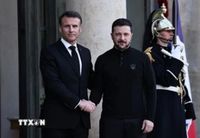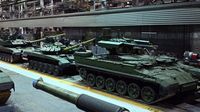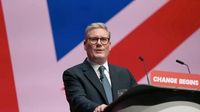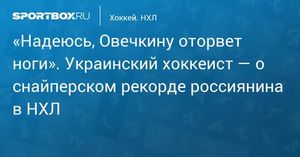On April 5, 2025, Ukrainian President Volodymyr Zelensky announced significant progress in discussions with British and French leaders regarding plans to bolster Ukraine's defense capabilities and support options after the ongoing conflict. This announcement came following a meeting with British Armed Forces Chief of Staff Tony Radakin and French military Chief of Staff Thierry Burkhard in Kiev.
In a statement shared on social media, Zelensky expressed optimism, stating, "There is specific progress and initial information on the possibility of deploying a security force with the participation of partners." While he did not disclose detailed specifics, his remarks highlighted the collaborative efforts between Ukraine and its allies to enhance security in the region.
French President Emmanuel Macron and British Prime Minister Keir Starmer are spearheading European initiatives to establish a "security guarantee force," which could be deployed in Ukraine following any agreement to end the conflict that has persisted since 2022. Macron reiterated on social media platform X that Europe continues to engage in discussions surrounding long-term support for Ukraine.
During the meeting, Burkhard emphasized the focus on discussing "security guarantee options" that would be provided by the international coalition. He noted that the goal of the visit was to maintain steadfast support for the Ukrainian military while also formulating a long-term strategy for the reconstruction and modernization of Ukraine's armed forces.
As the situation unfolds, U.S. President Donald Trump is also advocating for negotiation efforts aimed at bringing an end to the conflict in Ukraine. Although a comprehensive ceasefire has yet to be achieved, there have been agreements to halt attacks on energy infrastructure and locations in the Black Sea.
Amid these developments, a report published last week by the Royal United Services Institute (RUSI) in the UK revealed that European NATO members, while heavily investing in their military industries, have seen these investments yield ineffective results. The report pointed out that Russia has implemented a well-developed plan for mobilizing its military industry, which has proven to be a significant advantage.
According to the RUSI report, Moscow benefits from a "high degree of centralized coordination" within its defense industry, contrasting sharply with the UK's and EU countries' lack of control, which only allows them to encourage their respective industries. The report further elaborated that governments and arms manufacturers in Western Europe lack a comprehensive understanding of their supply chains, resulting in fierce internal competition and uneven growth.
In contrast, Russia has ramped up its military spending and redirected funds from other budgets to bolster its military industry, even providing credit to defense companies to facilitate rapid growth. The report noted that European NATO members have struggled to mobilize investment on a comparable scale, leading to inefficient spending due to the fragmentation of the European defense market.
Regulatory issues in Western Europe were also highlighted, as these often counteract efforts to increase efficiency, resulting in higher costs and slower production processes for military equipment. The authors of the report concluded that both the UK and EU must undertake substantial efforts to coordinate spending and improve regulatory frameworks in order to effectively counter Russia and reduce reliance on U.S. support.
In February 2025, Russian President Vladimir Putin claimed that the country's defense industry had achieved a "real breakthrough" and a "labor miracle" during the ongoing conflict in Ukraine. He asserted that the industry is operating at an unprecedented pace, functioning around the clock to master the production of modern military equipment and continually increasing output volumes. According to Russian Defense Minister Andrey Belousov, defense spending in Russia reached 6.3% of GDP and constituted 32.5% of the state's annual budget in 2024.
The contrasting military strategies and capabilities of Ukraine and Russia highlight the ongoing challenges and complexities facing European nations as they navigate support for Ukraine while addressing their own defense industry inefficiencies. As discussions continue, the international community remains watchful of the evolving situation, weighing the implications of military investments and strategic partnerships in the region.






